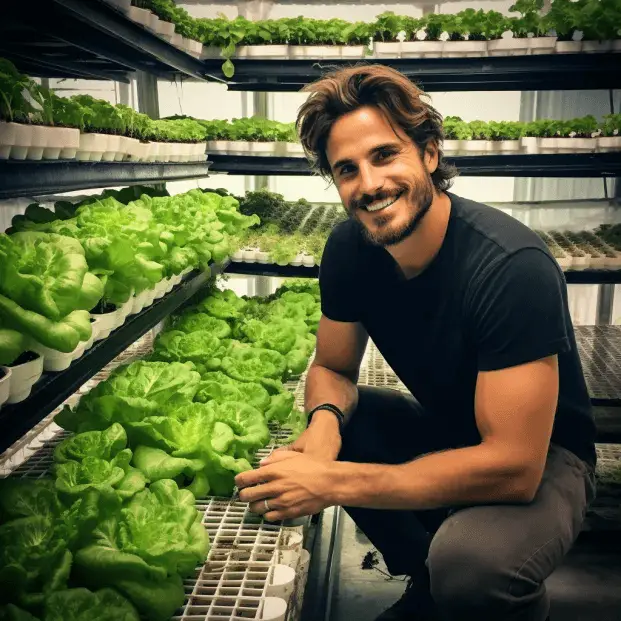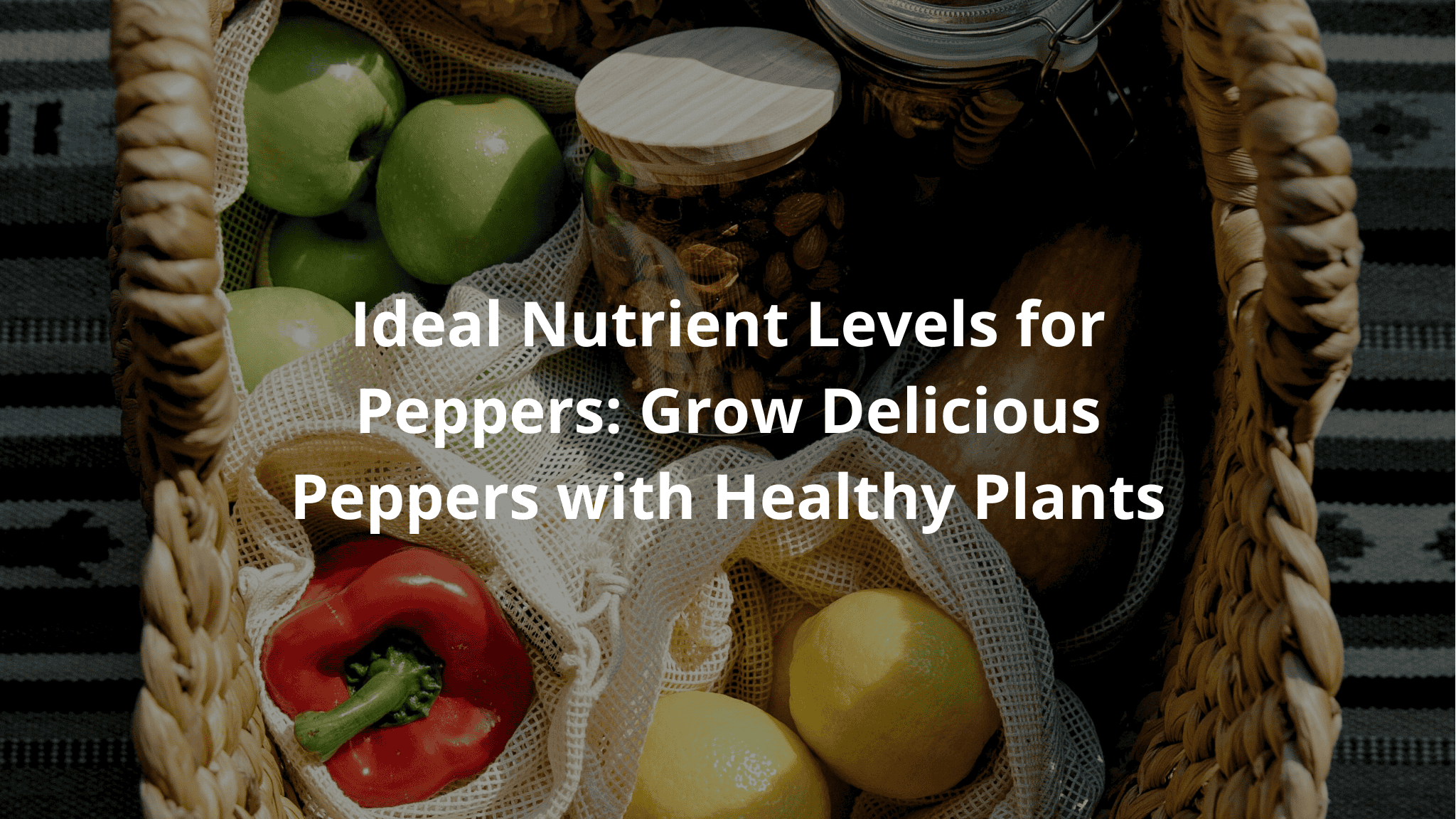Peppers come in many colors and tastes. Someone remembers the first time they bit into a freshly picked bell pepper. It was sweet and crunchy, a burst of flavor in their mouth. Growing peppers can be a fun adventure, but it is important to know the ideal nutrient levels for these plants. If someone wants to grow healthy pepper plants and enjoy a bountiful harvest, keep reading.(2)
Key Takeaway
- Peppers need balanced nutrients like nitrogen, phosphorus, and potassium for healthy growth.
- Different growth stages require different amounts of nutrients.
- Using the right fertilizer can prevent issues like nutrient burn and poor fruit production.
Understanding Nutritional Needs for Healthy Pepper Growth
Credits: Pepper Geek
Peppers, like all plants, need nutrients to grow well. Nutrients are like food for plants. They help them grow tall and strong and make tasty fruit. The main nutrients are nitrogen, phosphorus, and potassium.
- Nitrogen (N): This nutrient is very important for leafy growth. It helps make the green leaves that are needed for photosynthesis.
- Phosphorus (P): This nutrient supports root growth and blooming. It is important when the plants start to flower and produce fruit.
- Potassium (K): Potassium helps keep the plant healthy. It helps fight off diseases and keeps the fruit quality high.
If these nutrients are not balanced, problems can happen. For example, too much nitrogen can lead to lots of leaves but not enough fruit. How can one find the right balance? It’s all about mixing these nutrients correctly!
Nutrient Levels Through Different Growth Stages

Plants don’t need the same nutrients all the time. As they grow, their needs change. It’s like feeding a puppy. At first, they need a lot of protein, but as they grow, their diet changes.
- Establishment to Flowering Stage: Peppers need about 50-60 grams of nitrogen per cubic meter. They also need 15-20 grams of phosphorus and 75-80 grams of potassium.
- Fruit Development: When flowers turn into fruit, they need more nutrients. This means 80-100 grams of nitrogen, 25-30 grams of phosphorus, and 100-120 grams of potassium.
- Harvesting: Just before harvest, peppers need the most nutrients. Aim for 150-180 grams of nitrogen, 30-35 grams of phosphorus, and 200-230 grams of potassium for a great harvest.
Knowing these levels can help avoid problems like nutrient lockout. This happens when the plant can’t absorb nutrients properly. How can one keep track of these needs? Regular checks can help ensure plants get what they require!
Fertilizer Choices: What to Use for Your Pepper Plants
Fertilizers come in many forms, and each type has its benefits. You can choose from liquid fertilizers, synthetic fertilizers, or organic options like homemade compost or fish emulsion.
- Liquid Fertilizers: These are easy to apply and are quickly absorbed by the plants. They provide a fast boost when needed.
- Synthetic Fertilizers: These are chemical-based. If used correctly, they can give a quick boost to your plants.
- Organic Fertilizers: These include well-rotted manure or homemade compost. They help improve soil health over time and are gentle on the plants.
When picking fertilizer, look for balanced mixes that provide equal amounts of nitrogen (N), phosphorus (P), and potassium (K). Are there special mixes available? Yes, some are made for the needs of plants during the flowering stage or fruit development.
Avoiding Nutrient Burn and Other Issues
Too much of a good thing can be bad for pepper plants. Nutrient burn happens when too much fertilizer is used. The tips of the leaves might turn brown, which isn’t good.
To avoid nutrient burn, always follow the recommended amounts of fertilizer. Start with a small amount, and if the plants look healthy, slowly increase it.
Also, check the water quality. Good water helps move nutrients to the plant roots. If the water is too salty or has chlorine, it can harm the plants. What should one aim for? Always use clean, fresh water to keep the peppers happy.
Watering and Soil Health
Water is very important for pepper plants. It helps them take in nutrients. Without water, nutrients can’t reach the roots. So, how can one ensure the plants get enough water? Make sure your pepper plants have plenty to drink!(2)
Healthy soil is just as important. It acts like a cozy home for the plants. Adding homemade compost or well-rotted manure can improve the soil. These additions help the soil structure and provide a slow-release source of nutrients.
The pH level of the soil matters too. If the soil is too acidic or too alkaline, it can affect how well plants can get nutrients. Peppers like it best when the pH is around 7.0, which is neutral. How can one check the pH? You can easily test your soil with a simple kit from the garden center. This way, you can ensure your peppers are living in the best conditions possible!
Conclusion
Knowing the right nutrient levels for peppers helps in growing healthy plants that give tasty fruit. Following proper fertilization methods and watching growth stages can prevent nutrient burn and support good growth. Happy gardening!
FAQ
What is the role of nitrogen fertilizer in promoting leafy growth for healthy pepper plants?
Nitrogen fertilizer is important for helping pepper plants grow lots of green leaves. These leaves are crucial because they help the plant make food from sunlight. When there are enough leaves, the plants can grow strong and produce delicious peppers. If there isn’t enough nitrogen, the plants might not grow well, and you could end up with fewer peppers.
How can balanced fertilizer supply essential nutrients for different growth stages of pepper varieties?
Balanced fertilizer gives pepper plants the right mix of nutrients they need at different stages of growth. For example, when the plants start to flower, they need more phosphorus to help their roots and produce fruit. Using a good fertilizer mix ensures that your pepper varieties get what they need to grow healthy and produce lots of tasty peppers.
What are the benefits of using organic fertilizer such as homemade compost or well-rotted manure for pepper plants?
Organic fertilizers like homemade compost or well-rotted manure are great for pepper plants. They help improve the soil by adding nutrients naturally and encouraging helpful microbes. These fertilizers provide a steady supply of nutrients without the risk of burning the plants, which can happen with chemical fertilizers. Plus, they support healthy roots, leading to better growth and more peppers.
How can nutrient deficiencies affect the fruit quality and yield of hot peppers?
If pepper plants don’t get enough nutrients, it can hurt the quality and amount of fruit they produce. Plants might show signs like yellowing leaves or slow growth. This can lead to fewer peppers and lower quality fruit that may not taste as good. Keeping an eye on nutrient levels is important to ensure your hot peppers grow strong and flavorful.
What application methods can help prevent fertilizer burn in pepper crops?
To avoid fertilizer burn in your pepper crops, it’s important to apply fertilizers correctly. Start by using the right amount based on soil tests to prevent using too much. Mixing fertilizers into the soil before planting helps spread nutrients evenly and keeps them away from plant roots. Using liquid fertilizers like fish emulsion can also provide nutrients steadily without overwhelming the plants during key growth times. Certainly! Here are four additional questions using the remaining keywords:
How does water quality impact the nutrient levels and overall health of pepper plants?
Water quality is essential for maintaining proper nutrient levels and the overall health of pepper plants. Clean, uncontaminated water helps ensure that plants can absorb nutrients effectively from the soil. Poor water quality can lead to nutrient lockout, where plants cannot take up essential nutrients, resulting in unhealthy growth and lower fruit production. Regularly checking your water source can help keep your pepper plants thriving.
What are the signs of nutrient burn, and how can I avoid it when fertilizing my pepper plants?
Nutrient burn occurs when plants receive too much fertilizer, leading to brown leaf tips or edges and stunted growth. To avoid this, carefully follow the recommended amounts of fertilizer based on your pepper plants’ needs. It’s also a good idea to gradually introduce fertilizers, especially synthetic options, to prevent overwhelming the plants. Monitoring your plants regularly can help catch any issues early.
Why is soil health important for the root development of pepper crops?
Soil health is crucial for the root development of pepper crops because healthy soil provides a rich environment for roots to grow. Good soil structure allows roots to access water and nutrients easily, promoting strong plant growth. Additionally, healthy soil supports beneficial organisms that help break down organic matter, further enriching the soil. Investing in soil health leads to more robust pepper plants and a better harvest.
What role do secondary nutrients play in supporting healthy growth for pepper varieties?
Secondary nutrients, like calcium and magnesium, play an important role in supporting healthy growth for pepper varieties. These nutrients help strengthen cell walls, improve root development, and enhance overall plant resilience. They also contribute to better fruit quality and can prevent issues like blossom-end rot. Ensuring that your pepper plants receive these secondary nutrients helps promote vigorous growth and a more abundant harvest.
References
- https://www.haifa-group.com/articles/crop-guide-nutrients-pepper
- https://pepperjoe.com/blogs/grow-with-joe/best-fertilizer-for-peppers-how/
Related Articles
- https://tophydroponicgarden.com/the-easiest-plant-to-grow-in-hydroponics/
- https://tophydroponicgarden.com/nutrient-film-technique/
- https://tophydroponicgarden.com/what-plants-can-be-grown-using-aeroponics/
Was this helpful?

I’m Barrie L., a passionate hydroponic gardening enthusiast dedicated to cultivating thriving, soil-less gardens. With a focus on all things hydroponic, I share my expertise on innovative growing techniques and sustainable practices through my blog, tophydroponicgarden.com. As a seasoned hydroponics specialist, my goal is to inspire and guide fellow gardeners in harnessing the power of water-based cultivation for bountiful and eco-friendly harvests. I’m also an author of the book “Hydroponics For Absolute Beginners: Your Step By Step Guide For How To Create An Hydroponics System At Home Without Soil, For Growing Vegetable, Fruit And Herbs.” which is sold on Amazon. Join me on a journey of redefining the way we cultivate plants, one nutrient-rich solution at a time. Happy growing!


